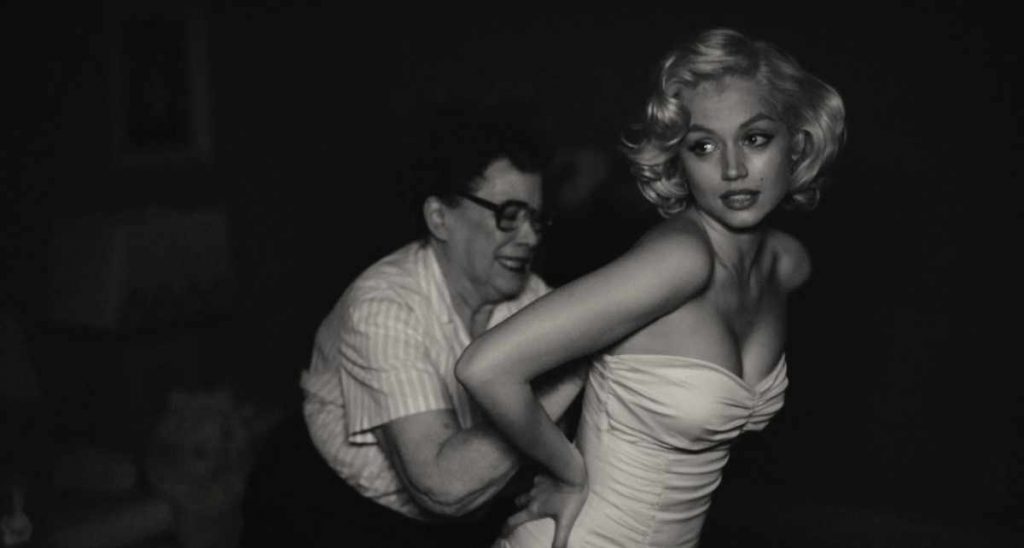
The Cuban actress, star of Andrew Dominik's film in competition in Venice, says of bringing the diva to the screen, but also Norma Jeane: "I made a connection with her pain and trauma. If we don't focus on the movie star, she was a woman like me who took me to dark places of great vulnerability."
Does Ana de Armas bring Norma Jeane or Marilyn to the screen? "I think most of the film focuses on Norma Jeane. But I also think she and Marilyn were feeding off each other. I didn't approach the character as if they were two separate entities. It's hard to explain but I felt a strong connection with the two characters emotionally. So I didn't make a conscious decision whether to focus more on Norma or Marilyn." The result is the two hours and 46 minutes of Blonde, which took director Andrew Dominik 11 years to prepare and which for the Cuban actress represents the most difficult test, the (real) debut among Hollywood bigwigs. Presented in competition in Venice, with producer Brad Pitt also making a surprise arrival on the red carpet, the film will arrive on Netflix on September 28 and is likely to take Ana de Armas to the upcoming Oscars.
Blonde, based on the novel by Joyce Carol Oates, traces the diva's private life from her complicated childhood with her mother trying to kill her, then the orphanage, and finally her transformation into Marilyn Monroe. "The film deals with the most intimate moments we don't know about," continued the 34-year-old Cuban who arrived at the lido with brown hair but visibly moved by her character, "I made a connection with her pain and trauma. If we don't focus on the movie star, she was a woman like me who I knew would require me to get to dark places of great vulnerability."
There is no shortage of strong scenes. In the United States, in fact, it will arrive banned to those under 17. There is precisely her mother's attempt to drown her, the violence she endures in the studio of a Hollywood bigwig, the drugs they stuff her with to make sure she continues to be Marilyn, the bodyguards who drag her "like a piece of meat" into the bed of the president of the United States. And then her manhanded husband Joe Di Maggio, the triangle with Charlie Chaplin and of Edward G. Robinson. But most striking is the indifference, and her great sense of loneliness that finds no peace. Until the end. "A lot of things happened on the set during filming. I think she was with us," the actress continued, "We had great respect and a sense of responsibility to do her justice, we had the feeling that we were in her service, that we were doing something bigger than ourselves. I was dreaming about her, just talking about her. She was with me. It was beautiful and I think she was happy." And again, "I wasn't always in character but somehow I felt like I was living that heaviness and feeling that sadness. It was hard to get rid of it and maybe I didn't want to. I used that pain. I didn't want to protect myself; it was important for me to experience it. It is an experience I carry with me, this film changed my life."
Of the same opinion is the director: "We started shooting film on August 4, the anniversary of his death, it was not planned. We realized it the day before. We were in the same apartment where he had lived with his mother. The room where the character dies is actually the room where Marilyn had died. There are traces of her everywhere; it was like a séance."
Andrew Dominik was in no hurry to find his Marilyn: "I had seen Ana de Armas in the movie Knock, Knock, she looked a lot like her, she had the same on-screen characteristic of catalyzing attention. Then it took two years to arrange the meeting, but I knew it had to be her. It was love at first sight as soon as I saw her." Also in the cast are Adrien Brody (Arthur Miller), Bobby Cannavale (Joe Di Maggio), Xavier Samuel, Julianne Nicholson, and Lily Fisher.
What remains of Marilyn today the director explains: "There is an article Truman Capote wrote, The Beautiful Child, in which he tells of an afternoon spent with her. It is extraordinary. She was the American love goddess. She had everything society wanted: fame, beauty, relationships with the coolest men. And then she ended up killing herself. I don't believe in murder, it doesn't make sense to me. Being the object of other people's desire can be destructive."

Written by Michael Zippo
Michael Zippo, passionate Webmaster and Publisher, stands out for his versatility in online dissemination. Through his blog, he explores topics ranging from celebrity net worth to business dynamics, the economy, and developments in IT and programming. His professional presence on LinkedIn - https://www.linkedin.com/in/michael-zippo-9136441b1/ - is a reflection of his dedication to the industry, while managing platforms such as EmergeSocial.NET and theworldtimes.org highlights his expertise in creating informative and timely content. Involved in significant projects such as python.engineering, Michael offers a unique experience in the digital world, inviting the public to explore the many facets online with him.
